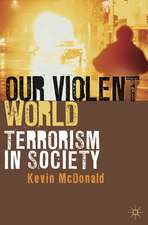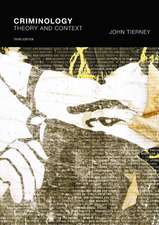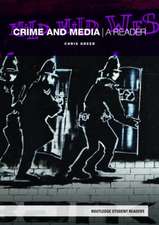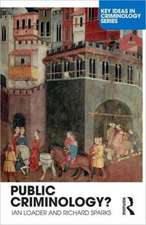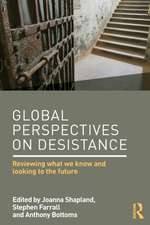Engaging with Ethics in International Criminological Research
Editat de Michael Adorjan, Rose Ricciardellien Limba Engleză Paperback – 23 iun 2016
This book is divided into four parts:
- Part I, Institutional arrangements and positionality, explores the ongoing and expanding process of ethics protocol and procedures, principles of confidentiality, and the positionality of the researcher.
- Part II, Trust and research with vulnerable populations, examines the complexity of work involving prisoners, indigenous peoples and victims of extreme violence, power dynamics between researchers and participants, and the challenges of informed consent.
- Part III, Research on and with police, reflects on the importance of transparent relations with police, best practices, and the consequences of undertaking research in authoritarian contexts.
- Part IV, Emerging areas, scrutinizes the ethics of carceral tours and suggests possible alternatives, and offers one of the first sociological and criminological examinations of dark net cryptomarkets.
| Toate formatele și edițiile | Preț | Express |
|---|---|---|
| Paperback (1) | 324.41 lei 43-57 zile | |
| Taylor & Francis – 23 iun 2016 | 324.41 lei 43-57 zile | |
| Hardback (1) | 765.01 lei 43-57 zile | |
| Taylor & Francis – 28 iun 2016 | 765.01 lei 43-57 zile |
Preț: 324.41 lei
Preț vechi: 378.77 lei
-14% Nou
Puncte Express: 487
Preț estimativ în valută:
62.07€ • 64.99$ • 51.36£
62.07€ • 64.99$ • 51.36£
Carte tipărită la comandă
Livrare economică 07-21 aprilie
Preluare comenzi: 021 569.72.76
Specificații
ISBN-13: 9781138938403
ISBN-10: 1138938408
Pagini: 258
Ilustrații: 10
Dimensiuni: 156 x 234 x 18 mm
Greutate: 0.41 kg
Ediția:1
Editura: Taylor & Francis
Colecția Routledge
Locul publicării:Oxford, United Kingdom
ISBN-10: 1138938408
Pagini: 258
Ilustrații: 10
Dimensiuni: 156 x 234 x 18 mm
Greutate: 0.41 kg
Ediția:1
Editura: Taylor & Francis
Colecția Routledge
Locul publicării:Oxford, United Kingdom
Public țintă
Postgraduate and UndergraduateCuprins
1. Introduction (Michael Adorjan and Rose Ricciardelli)
Part I: Institutional Arrangements & Positionality
2. Ethics Creep: Governing Social Science Research in the Name of Ethics (Kevin Haggerty)
3. The Ethical Imagination - Reflections on conducting research in Hong Kong (Michael Adorjan)
4. Ethics, Politics and the Limits to Knowledge (Pat Carlen)
Part II: Trust and Research with Vulnerable Populations
5. A History of Coercive Practices: The Abuse of Consent in Research involving Prisoners and Prisons in the United States (Mark Israel)
6. Indigenous Peoples, Research and Ethics (Maggie Walter)
7. Ethics as Witnessing: ‘Science’, Research Ethics, and Victimization (Dale Spencer)
Part III: Research on and with Police
8. Navigating Research Relationships: Academia and Criminal Justice Agencies (Erin Gibbs Van Brunschot)
9. Commanding Officer, faculty member, and student: Auto-ethnographic experiences of academic-police collaborative partnerships (Rose Ricciardelli, Laura Huey, Hayley Crichton, and Tracy Hardy)
10. Criminologizing Everyday Life and Doing Policing Ethnography in China (Jianhua Xu)
Part IV: Emerging Areas
11. Carceral Tours and Missed Opportunities: Revisiting conceptual, ethical and pedagogical dilemmas (Justin Piché, Kevin Walby and Craig Minogue)
12. Illuminating the Dark Net: Methods and Ethics in Cryptomarket Research (James Martin)
13. Conclusion (Rose Ricciardelli and Michael Adorjan)
Part I: Institutional Arrangements & Positionality
2. Ethics Creep: Governing Social Science Research in the Name of Ethics (Kevin Haggerty)
3. The Ethical Imagination - Reflections on conducting research in Hong Kong (Michael Adorjan)
4. Ethics, Politics and the Limits to Knowledge (Pat Carlen)
Part II: Trust and Research with Vulnerable Populations
5. A History of Coercive Practices: The Abuse of Consent in Research involving Prisoners and Prisons in the United States (Mark Israel)
6. Indigenous Peoples, Research and Ethics (Maggie Walter)
7. Ethics as Witnessing: ‘Science’, Research Ethics, and Victimization (Dale Spencer)
Part III: Research on and with Police
8. Navigating Research Relationships: Academia and Criminal Justice Agencies (Erin Gibbs Van Brunschot)
9. Commanding Officer, faculty member, and student: Auto-ethnographic experiences of academic-police collaborative partnerships (Rose Ricciardelli, Laura Huey, Hayley Crichton, and Tracy Hardy)
10. Criminologizing Everyday Life and Doing Policing Ethnography in China (Jianhua Xu)
Part IV: Emerging Areas
11. Carceral Tours and Missed Opportunities: Revisiting conceptual, ethical and pedagogical dilemmas (Justin Piché, Kevin Walby and Craig Minogue)
12. Illuminating the Dark Net: Methods and Ethics in Cryptomarket Research (James Martin)
13. Conclusion (Rose Ricciardelli and Michael Adorjan)
Recenzii
"Engaging with Ethics in International Criminological Research brings the ethical issues and challenges confronted by the criminological researcher to life. Rather than provide dry guidance on how to navigate institutional ethics review, it contains a wealth of insights – from international scholars at the forefront to contemporary criminology – into the ethical thinking and decision-making involved in all serious criminology. These contributions are full of interesting and thought-provoking discussion of profound moral issues. It will be of interest to anyone researching, studying, or teaching criminology."
Gerry Johnstone, Professor of Law, University of Hull, UK
"Drawing on scholars studying myriad international sites, Engaging with Ethics goes beyond other books that merely criticize the power structure providing a blockade for research, instead offering programmatic statements and examples of how to navigate through these barriers to produce empirically rich, theoretically driven, yet ethical research that honors both those we study and those who write about criminals and criminal justice settings."
Patricia A. Adler, Professor Emeritus, University of Colorado, and Peter Adler, Professor Emeritus, University of Denver, USA
"Universities have defined ‘ethics up’. In doing so they have fundamentally reshaped, and are actively reshaping, how research is done. Nowhere is this more evident than in Criminology. Engaging with Ethics offers insightful reflections on this ‘ethical creep’ – its history and its implication across geographically dispersed research areas. It calls for an ‘ethical imagination’ grounded in the ‘lived experiences’ of active, experienced and sensitive researchers."
Clifford Shearing, Professor in the School of Criminology and Criminal Justice, Griffith University, Australia
"Adorjan and Ricciardelli and the contributors have assembled a valuable set of materials on a critical, yet understudied topic. They take the reader inside the dynamics of field research to explore areas not covered in traditional methods texts. A must-read for both experienced and novice field researchers."
Curt Taylor Griffiths, Professor and Director of thePolice Studies Centre, Simon Fraser University, Canada
Gerry Johnstone, Professor of Law, University of Hull, UK
"Drawing on scholars studying myriad international sites, Engaging with Ethics goes beyond other books that merely criticize the power structure providing a blockade for research, instead offering programmatic statements and examples of how to navigate through these barriers to produce empirically rich, theoretically driven, yet ethical research that honors both those we study and those who write about criminals and criminal justice settings."
Patricia A. Adler, Professor Emeritus, University of Colorado, and Peter Adler, Professor Emeritus, University of Denver, USA
"Universities have defined ‘ethics up’. In doing so they have fundamentally reshaped, and are actively reshaping, how research is done. Nowhere is this more evident than in Criminology. Engaging with Ethics offers insightful reflections on this ‘ethical creep’ – its history and its implication across geographically dispersed research areas. It calls for an ‘ethical imagination’ grounded in the ‘lived experiences’ of active, experienced and sensitive researchers."
Clifford Shearing, Professor in the School of Criminology and Criminal Justice, Griffith University, Australia
"Adorjan and Ricciardelli and the contributors have assembled a valuable set of materials on a critical, yet understudied topic. They take the reader inside the dynamics of field research to explore areas not covered in traditional methods texts. A must-read for both experienced and novice field researchers."
Curt Taylor Griffiths, Professor and Director of thePolice Studies Centre, Simon Fraser University, Canada
Descriere
Drawing on the experiences and expertise of a range of international contributors, this books centres on the realpolitik of conducting criminological research and discusses the ethical challenges and dilemmas involved.

